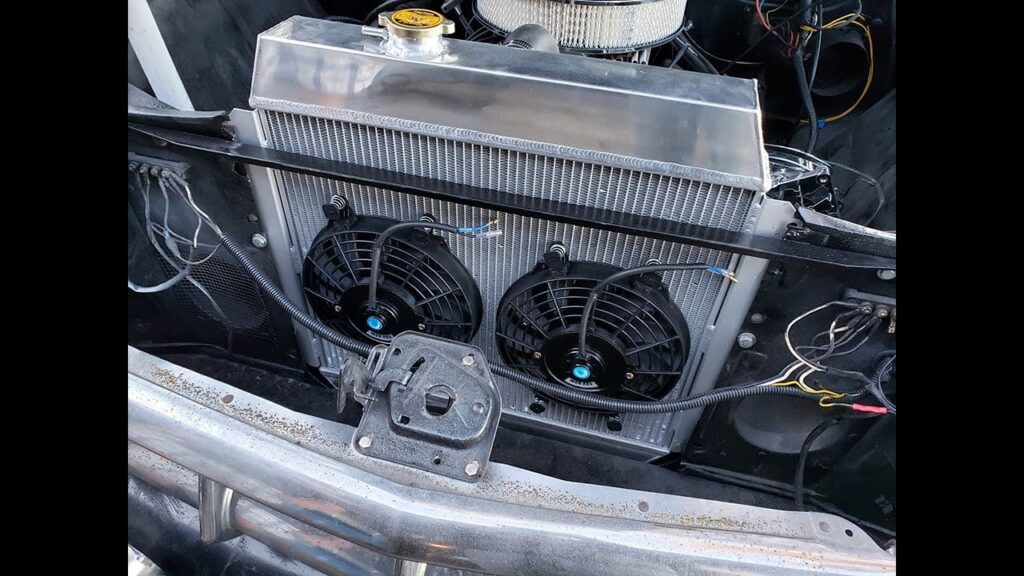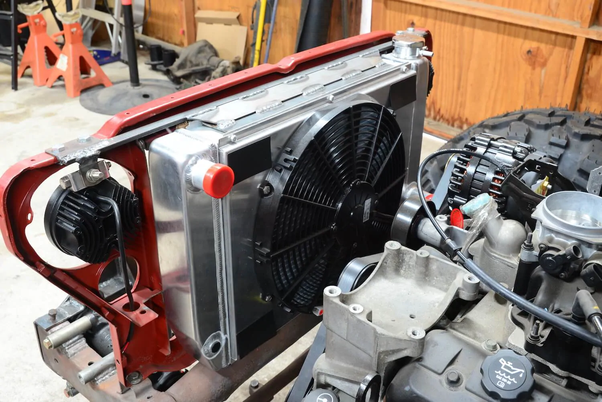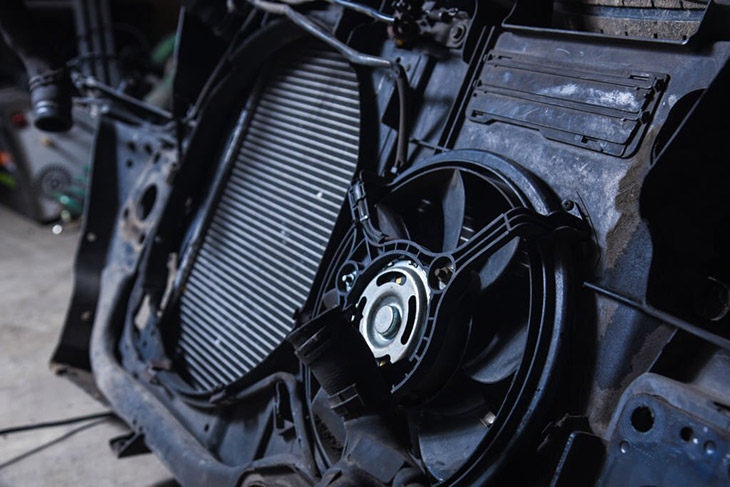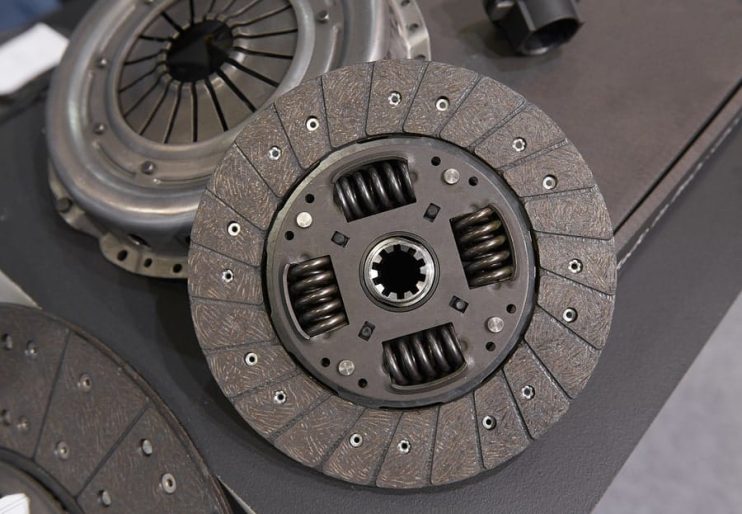The cooling fan in a car should typically run for a few minutes after the car is turned off. This post-engine shutdown fan operation helps disperse the remaining heat from the engine and other components. Also, the exact duration can differ, influenced by variables like the car’s make, model, and recent driving conditions.
It’s common for this period to range from 1 to 10 minutes. However, if you find that the fan runs excessively or the engine consistently overheats, it’s advisable to have the cooling system inspected. Moreover, referring to the owner’s manual is recommended for precise guidelines regarding your specific car.
How does the car engine fan work?
The car engine fan, also known as the radiator fan, is crucial in maintaining the engine’s optimal operating temperature. It prevents overheating by dissipating heat generated during combustion and friction. There are two main types of engine fans: mechanical fans and electric fans. Here’s how each type works:
Mechanical Fans
Mechanical fans are usually connected to the engine via a belt and pulley system. As the engine runs, the fan spins due to the rotational force from the engine’s crankshaft. The spinning fan draws air through the radiator, which helps cool down the heated coolant passing through it. These fans are directly controlled by the engine’s RPM (revolutions per minute) and provide consistent airflow regardless of the engine’s temperature.
Electric Fans
Electric fans are driven by electric motors and are controlled by temperature sensors, relays, and the vehicle’s engine control unit (ECU). When the engine temperature rises beyond a certain threshold, the temperature sensor sends a signal to the ECU. The ECU then activates the electric fan to start running. This fan draws air through the radiator to cool the coolant. The ECU turns off the electric fan once the engine temperature drops to an acceptable level.
Moreover, both types of fans maintain the engine’s temperature within a safe range. They are particularly important during low-speed or idle conditions when the radiator has less natural airflow. Proper cooling is essential for engine efficiency, performance, and longevity.
Why the fan is important

The fan in a car’s engine cooling system is of paramount importance for several crucial reasons:
Preventing Overheating
The primary role of the fan is to prevent the engine from overheating. As the engine operates, it generates significant heat. If this heat is not properly managed, it can lead to engine damage, reduced performance, and even complete breakdown. The fan helps dissipate excess heat, maintaining the engine’s optimal operating temperature.
Optimizing Performance
Engines function best within a specific temperature range. Too much heat can cause various components to expand, leading to increased friction and wear. Conversely, running too cold can negatively impact fuel efficiency and emissions control. The fan helps maintain the engine’s temperature within the ideal range, enhancing overall performance and efficiency.
Coolant Regulation
The fan aids in cooling the engine’s coolant as it circulates through the radiator. This coolant absorbs heat from the engine and carries it to the radiator, where the fan helps lower its temperature before recirculating it back to the engine. Efficient cooling ensures that the coolant can effectively absorb and carry away heat.
Preventing Component Damage
High temperatures can harm various engine components, including gaskets, seals, and plastic parts. Prolonged exposure to excessive heat can lead to premature deterioration and eventual failure. The fan’s cooling action helps extend the lifespan of these critical components.
Avoiding Performance Loss
Overheating can cause the engine to enter a “limp mode” or reduce power output to prevent damage. This can be particularly problematic when you need the engine’s full power, such as when towing, accelerating onto highways, or driving uphill.
Enhancing Longevity
Proper temperature regulation through the fan’s action contributes to the engine’s longevity. By preventing excessive wear and tear due to heat-related stress, the fan helps ensure the engine’s durability over time.
Moreover, the fan plays a vital role in maintaining a healthy and efficient engine. It ensures that the engine operates within the optimal temperature range, helping to prevent damage, maximize performance, and extend the overall lifespan of the vehicle.
How do you know if the car fan isn’t working?
Detecting a malfunctioning car fan is crucial for preventing engine overheating. Here’s how you know if the car fan isn’t working:
- Watch the temperature gauge on your dashboard. If it consistently shows higher-than-normal readings, it might indicate inadequate cooling due to a non-functional fan.
- Many cars have warning lights for engine temperature. If this light is illuminated or flashing, it indicates overheating and a possible fan problem.
- While the engine is running, open the hood and observe the fan. If the fan doesn’t turn on even when the engine is hot, it could signal a malfunction.
- Turn on the air conditioning. In many cars, the fan should turn on automatically when the A/C is running. If the A/C performance is poor or warm air is blowing, the fan might not function.
- Listen for the sound of the fan running while the engine is idling. There might be an issue if the fan is supposed to be on, but you don’t hear it.
- Check the fan visually with the engine off and cool. Look for any visible damage, such as bent or broken blades. Additionally, inspect the fan’s electrical connections for any signs of wear or disconnection.
- If the engine temperature fluctuates erratically, particularly during idle or low-speed situations, it could indicate a fan that’s not working properly.
- An overheating engine can emit a burning smell. If you notice such an odor, it could be due to the fan not adequately cooling the engine.
- A non-functional fan can lead to coolant overheating, which might result in leaks. Look for puddles of coolant under your car.
Moreover, if you suspect your car’s fan isn’t working, promptly addressing the issue is important. Driving with an overheating engine can cause serious damage. Consult your vehicle’s manual or seek professional assistance to diagnose and fix the problem.
What to do if your engine fan is not running off after a while
If you find that your engine fan continues to run for an extended period, follow these steps:
- Immediately shut off the engine to prevent potential damage.
- Give the engine time to cool down, which can help reset any potential system issues.
- Ensure your coolant levels are within the recommended range, as low coolant can affect engine temperature and fan operation.
- Inspect the fan, including blades, belts (for mechanical fans), and electrical connections (for electric fans), for any visible damage.
- Faulty temperature sensors might cause prolonged fan operation. Consult a mechanic to diagnose and replace these components if necessary.
- Examine the relays and fuses that control electric fans. A malfunction here can lead to continuous fan running.
- If the issue persists, seek a professional mechanic’s expertise. They can pinpoint the exact problem, whether it’s the fan motor, thermostat, cooling system, or another factor.
- If fan operation drains the battery, as a short-term solution, consider disconnecting the battery until the issue is resolved. However, this isn’t a suitable long-term fix.
- Refrain from driving if the fan consistently operates. Continuous high temperatures can damage the engine.
Moreover, promptly addressing a persistent fan issue is vital to prevent engine damage. Seek a qualified mechanic’s assistance for accurate diagnosis and resolution.
Why Is My Car Fan Still Running When the Car Is Off?

If your car’s fan continues to run even after you’ve turned off the engine, several factors might be at play:
- The fan could stay on briefly to disperse residual engine heat, a normal safeguard against overheating.
- A faulty relay can keep the fan running by failing to cut off the electrical circuit after the engine shutdown.
- A misreading by the temperature sensor might erroneously trigger the fan to run when the engine is off.
- Software bugs can lead to unexpected fan behavior, including post-engine shutdown operation.
- Low coolant levels or a problematic water pump could prompt the fan to cool the engine after it’s turned off.
- Some cars have a separate fan for A/C components that cools them down after the engine stops.
- Wiring issues like shorts or damaged connections might disrupt proper fan functioning.
- A mechanical fan could continue turning due to residual momentum, but it should eventually come to a halt.
Moreover, if this issue arises, turn off the engine and investigate. Should the fan persistently run, or if you’re concerned, consult a professional mechanic. Swiftly addressing the root cause prevents battery drain, potential engine damage, and other complications.
FAQs
Why does my car fan keep turning on and off
The primary reason your car fan cycles on and off is to regulate engine temperature. As the engine heats up during operation, the fan cools it down. Once the temperature drops to a certain level, the fan switches off. This consistent cycling maintains the engine’s optimal temperature for efficient performance and prevents overheating.
Is using a car fan better than AC?
Yes, using a car fan is better than AC. Because using the car fan is more energy-efficient than the AC. AC often requires the engine to run. The fan, powered by the battery, operates without the engine, but prolonged use can deplete the battery. While the AC provides stronger cooling. Additionally, the fan is a more sustainable option for short periods when the engine is off.
Is it OK to leave a fan on 24 7?
Even though the fan can keep running for more than 24 hours, but leaving a fan on 24/7 isn’t typically recommended due to potential energy consumption and wear on the fan’s motor. It’s better to use the fan when needed for mechanical longevity and energy conservation. However, electric fans are safer than some appliances for continuous use due to their lower heat production.
Final Verdict
The car fan’s duration after the engine is turned off varies by vehicle. Generally, it’s designed to continue for a few minutes to disperse residual heat and prevent overheating.
However, if the fan runs excessively longer or the engine overheats, there might be cooling system issues. Consulting your car’s manual or a professional mechanic can provide specific guidance based on your vehicle’s make and model.
Moreover, for further insights, read our comprehensive article on engine cooling and maintenance. It’s essential to ensure your vehicle’s health and longevity.















